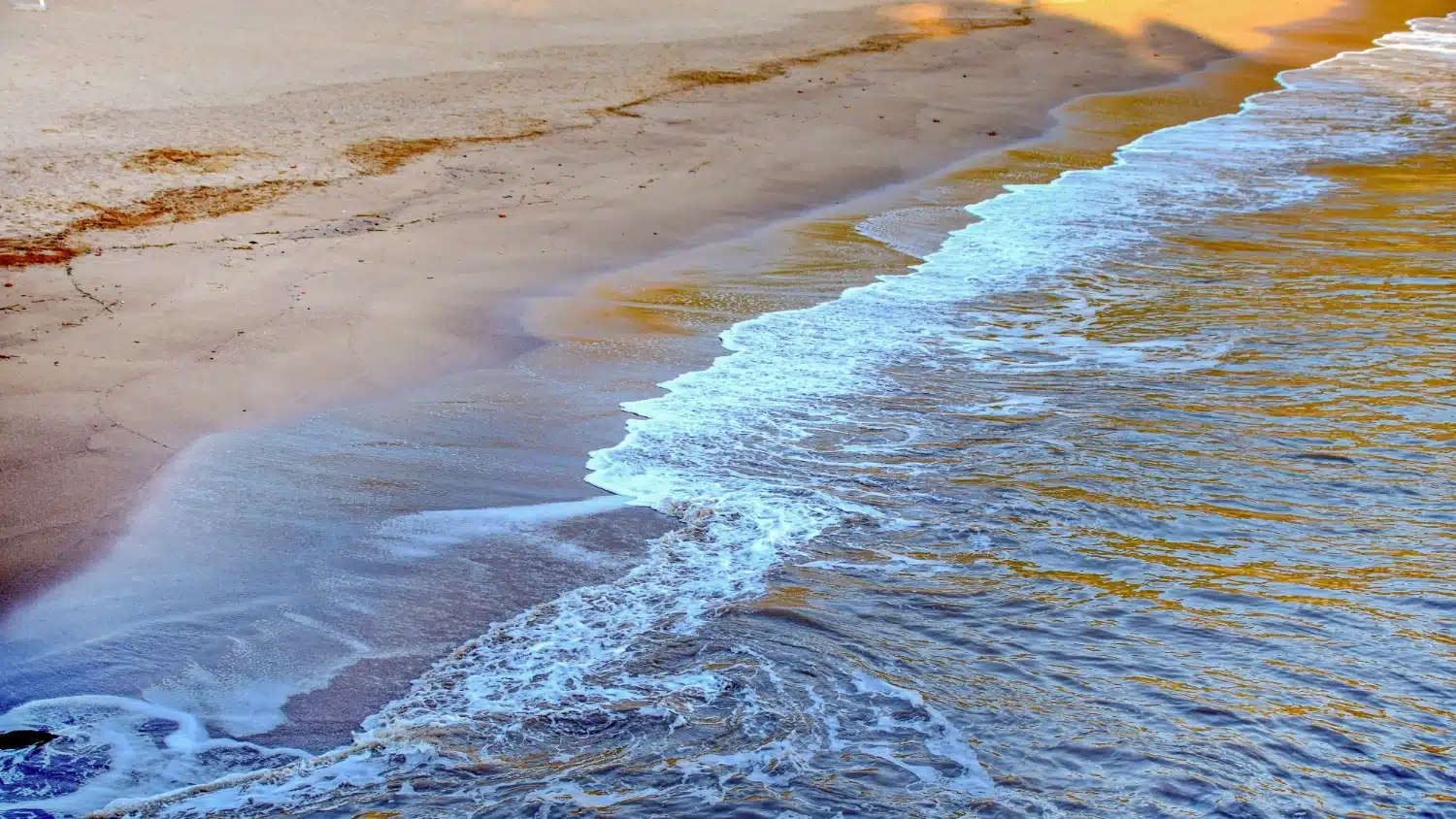Cuprins
- 1 What are wild beaches and why they’re worth exploring
- 2 Preparing for a trip to Romania’s wild beaches
- 3 Top wild beaches at the Black Sea
- 4 Wild beaches in the Danube Delta
- 5 Wild beaches by the Danube and lakes
- 6 Unique activities and experiences at wild beaches
- 7 Preserving and protecting wild beaches
- 8 Frequently asked questions (FAQ) about Romania’s wild beaches
- 9 Conclusion: 6 key things to remember
| Romania’s wild beaches are an alternative to crowded resorts, offering an authentic nature experience away from noise and human intervention.
💡 Essential:
🎯 Choose your path:
Why now: Ecotourism and modern camping options such as Green Dolphin Camping make these areas more accessible than ever, perfectly combining wilderness adventure with a higher level of comfort. |
- What are wild beaches and why they are worth exploring
- Preparing for a trip to Romania’s wild beaches
- Top wild beaches on the Black Sea
- Wild beaches in the Danube Delta
- Wild beaches by the Danube and lakes
- Unique activities and experiences at wild beaches
- Conservation and protection of wild beaches
- FAQ about wild beaches in Romania
- Conclusion: 6 key points to remember
What are wild beaches and why they’re worth exploring
Wild beaches are stretches of coastline untouched by major human intervention, true sanctuaries of peace and authenticity.
They are recognized for:
- Total lack of construction: You won’t find hotels, terraces or sun loungers.
- Undeveloped access: Reached by hidden paths or by boat.
- Natural landscape: Their appearance is shaped exclusively by wind, water and vegetation.
Why it’s worth exploring?
It’s worth discovering them to enjoy:
- Absolute silence: A real break from the noise and bustle of everyday life.
- Spectacular landscapes: perfect settings for photography and unforgettable moments.
- Biodiversity: the opportunity to observe rare birds and plants in their habitat.
- Genuine connection: A direct and deep connection with nature.
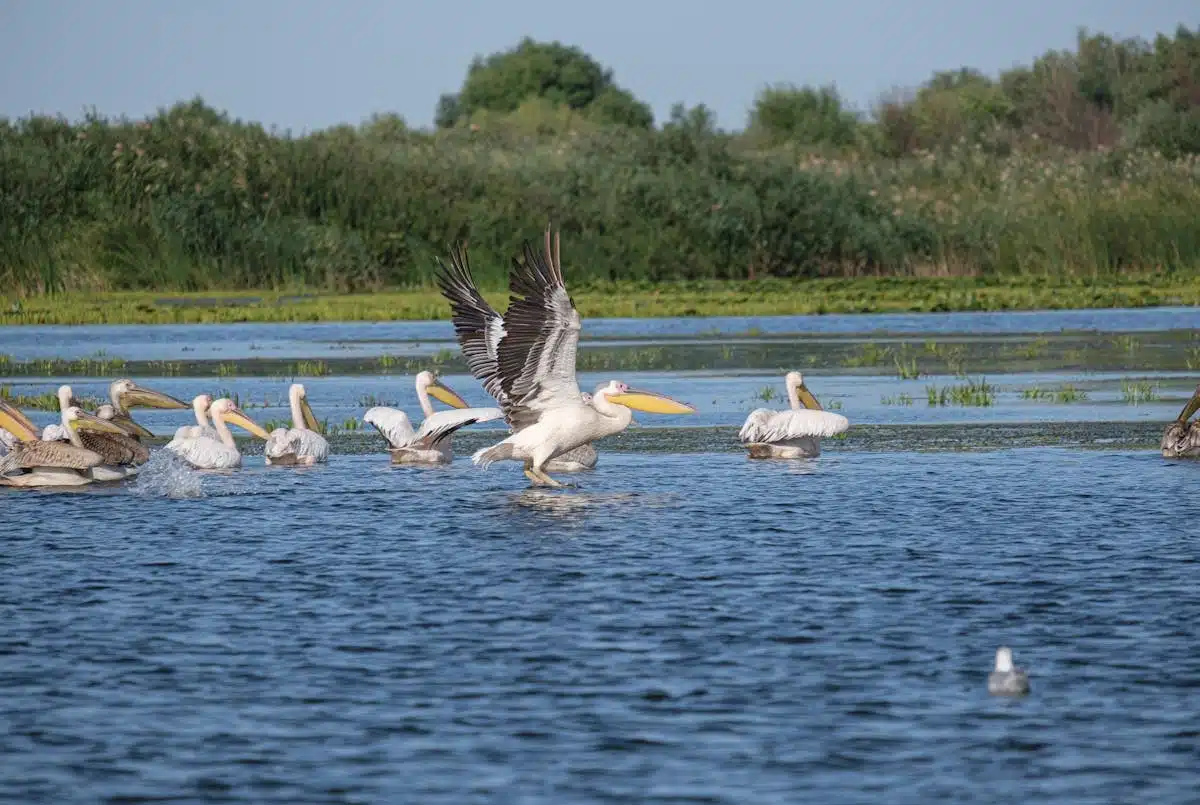
Pelicans, Danube Delta
🐦 Nature and bird watching enthusiast? Choose one of the recommended areas in this article and embark on an authentic birdwatching experience in Romania – whether you choose the Danube Delta, the Macin Mountains or the mountain forests, you’ll discover rare species, spectacular landscapes and moments of absolute tranquility in the wild.
Preparing for a trip to Romania’s wild beaches
A wild beach adventure requires meticulous planning.
- Essential equipment: A windproof tent, sleeping bag, sufficient food and water supplies, appropriate clothing, sunscreen (sunscreen, hat) and a well-equipped first aid kit are indispensable.
- Navigation and orientation: Maps, compass or a GPS are crucial as phone signal may be non-existent. A flashlight and garbage collection bags are mandatory.
- Access and transportation: Check the condition of unpaved roads and choose a suitable vehicle. Sometimes access is by boat or on foot only.
- Safety measures: Inform someone of your plans, check the weather forecast and preferably travel in groups. Respect local wildlife and be aware of sea currents.
- Responsible camping: If you opt for wild camping, choose a site with minimal impact, light fires only in safe and supervised areas and don’t leave any waste behind.
Top wild beaches at the Black Sea
The Romanian coastline hides a number of wild beaches that offer an alternative to the crowded popular resorts.
Corbu beach: The untouched paradise of the Black Sea
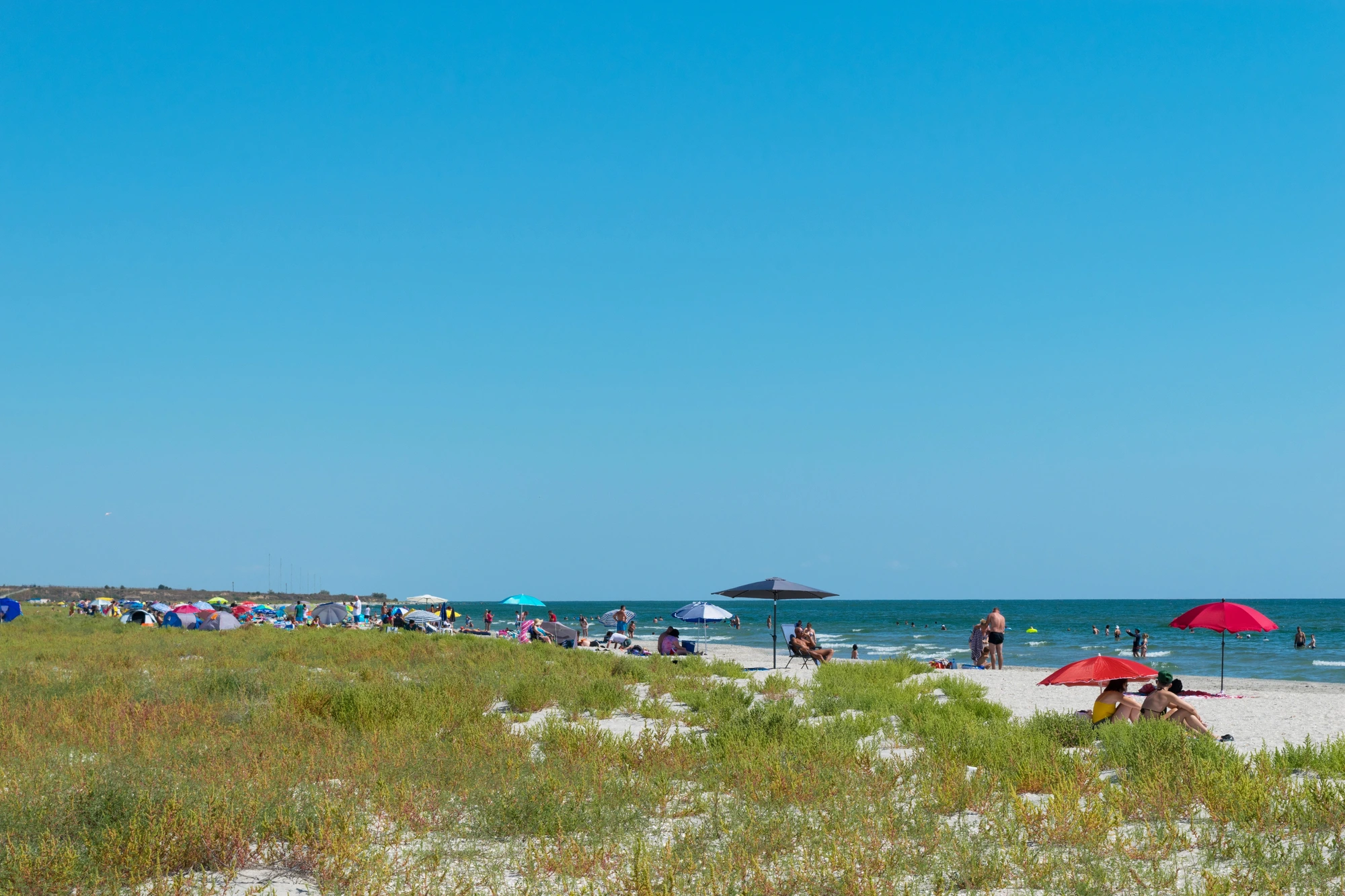
Corbu beach
- Nicknamed: The untouched paradise of the Black Sea.
- Features: One of the best preserved and stretched wild beaches, ideal for long walks and bird watching.
- Access: Follow the DJ226 road from Năvodari, which becomes unpaved near the beach.
- Facilities: A few fisheries and camping areas have sprung up, but natural charm predominates.
Vadu Beach: Between the sea and lagoons
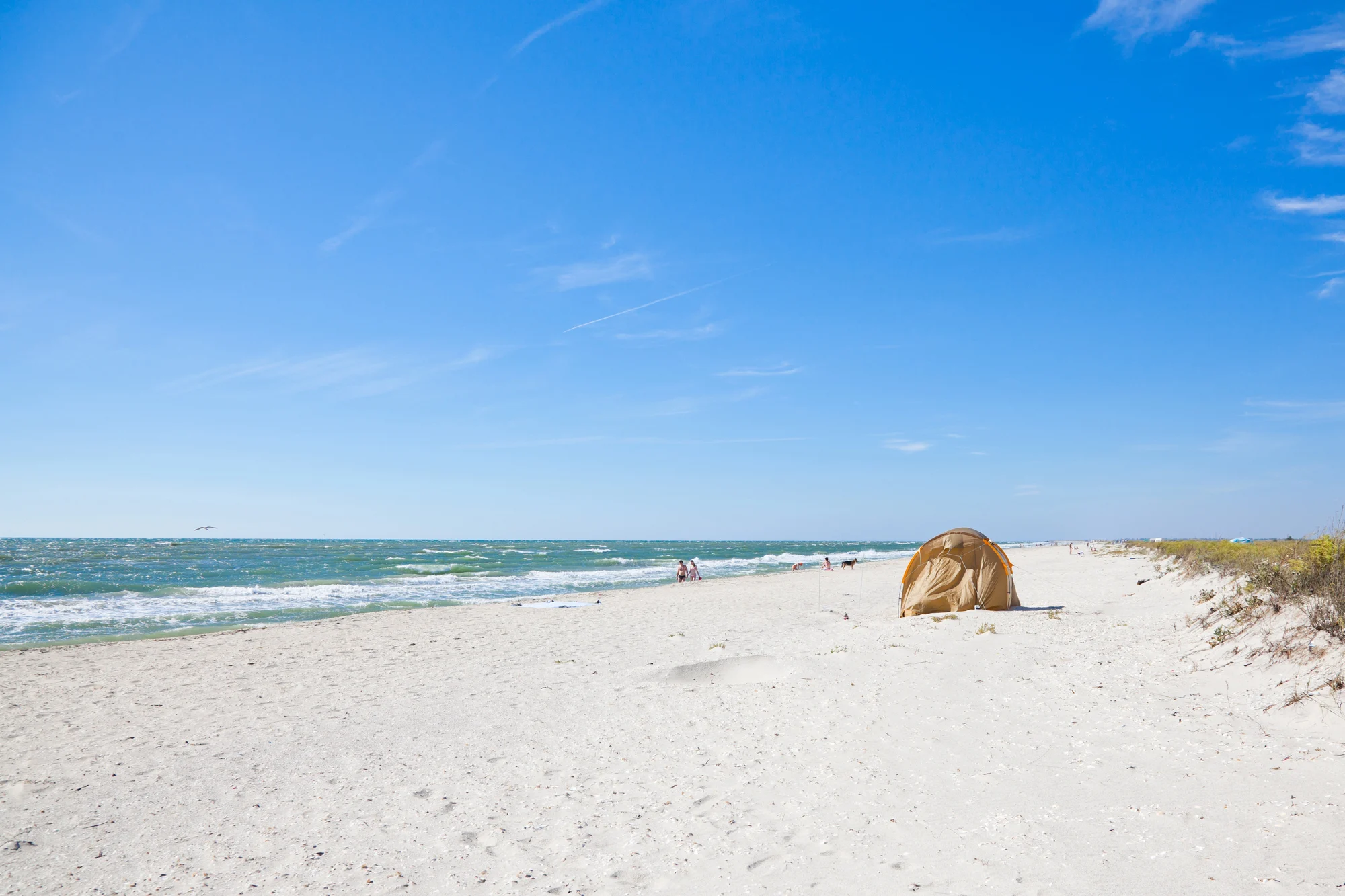
Vadu Beach
- Nicknamed: The beach between the sea and the lagoons.
- Features: Part of the Danube Delta Biosphere Reserve, offering a unique landscape and the opportunity to observe birds such as pelicans and egrets.
- Access: Requires a special permit to visit.
- Strict Rules: Access to the beach by motorized vehicles and camping outside the specially designated areas are prohibited.
Tuzla Beach: Turquoise waters and spectacular cliffs
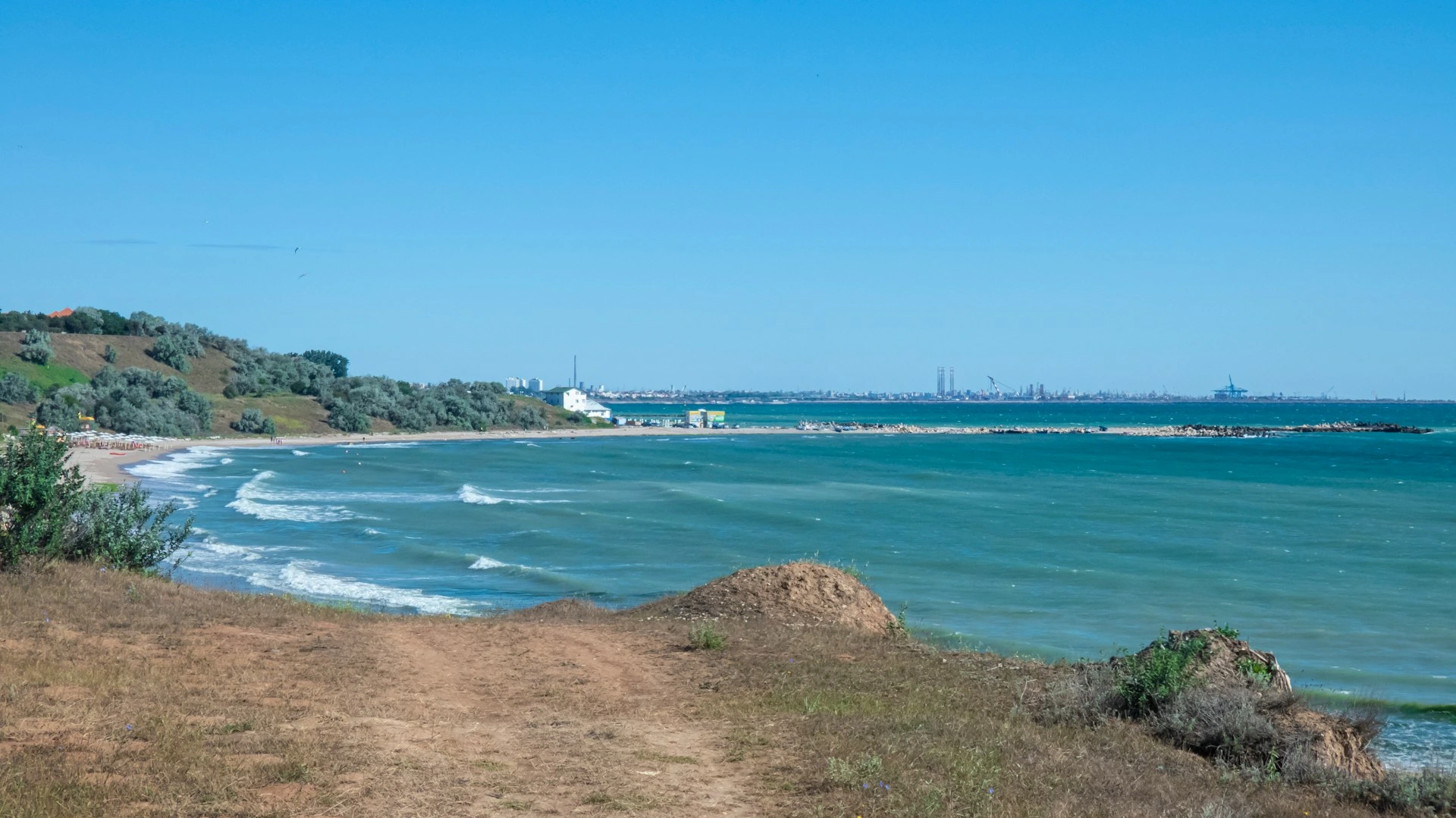
Wild beach, Tuzla
- Nicknamed: The beach with turquoise waters.
- Characteristics: It stands out for the vibrant color of the water, a rare phenomenon on the Romanian coast, and for the spectacular cliffs that delimit it.
- Facilities: The authentic experience is complemented by the small fisheries on the beach serving fresh fish.
Wild beaches in the Danube Delta
The Danube Delta offers unique unspoiled beaches where the river meets the sea. Access is usually by boat and the experience is rewarded with absolute tranquillity and unspoiled nature.
Sfântu Gheorghe Beach: Where the Danube meets the sea
- Nicknamed: The place where the Danube meets the sea.
- Features: A vast, fine sandy beach ideal for walks, boat trips and birdwatching.
- Atmosphere: Much more relaxed than the classic resorts, with sweeter seawater due to the influence of the Danube.
🌿 Discover the magic of the Danube from the heart of nature! If you dream of an authentic getaway, where you can go birdwatching at sunrise and enjoy a pristine beach at sunset, Green Dolphin Camping in Sfântu Gheorghe is the perfect destination.
📍 Accessible only by boat, the campsite offers modern comforts in the middle of the wilderness: eco-friendly accommodation, local restaurants, outdoor cinema and, above all, a complete glamping experience.
👉 Book your place in nature and experience a responsible, memorable and truly different vacation: https://www.dolphincamping.ro/en/contact-us/
Sulina Beach: History and wilderness
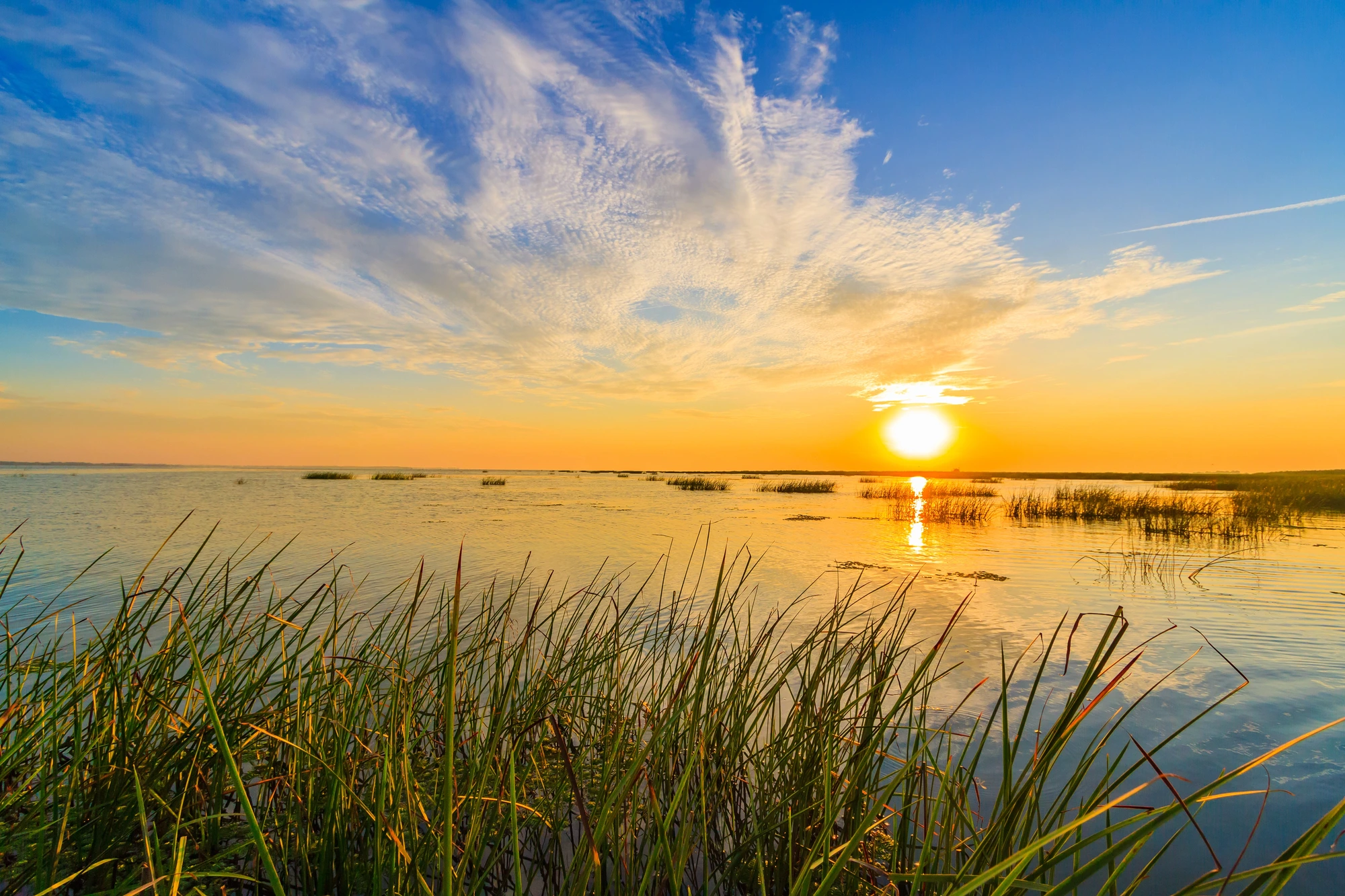
Sunrise seen from the kayak on the Sulina canal which flows into the Black Sea
- Supranumita: History and wilderness.
- Features: A unique combination of a sprawling beach and the cultural attractions of an ancient harbor town.
- Historical Attractions: In addition to the beach, you can visit sights such as the Old Lighthouse, the European Danube Commission Palace and the Maritime Cemetery, which reflect the rich history of the area.
Wild beaches by the Danube and lakes
Romania offers wild beach experiences beyond the seaside.
Gostinu Beach: Peaceful oasis on the Danube bank
- Nicknamed: Peaceful oasis on the banks of the Danube.
- Location: Near Giurgiu.
- Features: A relaxing alternative to the seaside, with fine sand and a wooded area ideal for shade.
- Access: Easy, directly reachable by car.
- Unique Element: The landscape is constantly shaped by the river dynamics of the Danube, offering a living geography lesson.
Unique activities and experiences at wild beaches
As well as relaxation, wild beaches offer opportunities for:
- Birdwatching.
- Nature photography.
- Water sports (kitesurfing, SUP).
- Sport fishing.
- Camping and admiring the starry sky, away from light pollution.
Preserving and protecting wild beaches
Conserving these fragile areas is essential. Tourists can contribute directly by adopting responsible behavior:
- Leave no trace: Collect all waste, including any you find.
- Respect nature: Do not disturb animals or destroy vegetation.
- Be informed: Respect the rules of protected areas and the legislation in force.
- Support local: Buy local products and services to support the local economy.
Frequently asked questions (FAQ) about Romania’s wild beaches
Do I need a permit to visit all wild beaches?
No, not all of them. An access permit is mandatory for beaches within the Danube Delta Biosphere Reserve, such as Vadu and Sfântu Gheorghe. It can be purchased online from the ARBDD website. For most other beaches (Corbu, Tuzla, Gostinu) access is free.
What is the best time of the year to visit these beaches?
Late spring (May-June) and early fall (September) are ideal. Temperatures are pleasant, nature is vibrant, you avoid the summer heatwave and, most importantly, crowds are minimal. Summer (July-August) is popular, but can be crowded even in these remote areas.
Is it legal to have a bonfire on a wild beach?
The general rule is no. The law prohibits lighting fires directly on the beach or in protected areas to prevent fires and soil degradation. Fires are only allowed in specially designated and marked places, which are extremely rare in wilderness areas. It is safest to use a portable stove for cooking.
Can I bring my dog to a wild beach?
In general, yes, but responsibly. Make sure your pet doesn’t disturb local wildlife (especially ground-nesting birds) and other visitors. In protected areas, such as the Danube Delta, there may be stricter rules, so it’s a good idea to check in advance. And of course, always clean up after yourself.
What do I do if I can’t get a phone signal and I have an emergency?
Lack of signal is a reality in many of these areas. Before setting out, always inform someone of your exact route and estimated time of return. Make sure you have a complete first aid kit and the basic knowledge to use it. For more serious expeditions in very remote areas, a satellite communicator can be a life-saving investment.
Conclusion: 6 key things to remember
Do you feel inspired? Here’s how to turn inspiration into a memorable and responsible adventure:
- Choose your destination: Depending on your preferences – accessibility, type of landscape (sea, delta, river), level of seclusion – select the right beach from this guide.
- Check specific rules: Before you set off, look for up-to-date information on any permits required (e.g. for Vadu) and local rules, especially if you’re going to a protected area.
- Prepare your equipment: Use the list in the guidebook as a starting point. Don’t underestimate the importance of water, sunscreen and garbage bags. It’s better to have something extra than to lack it.
- Plan transportation: Check the road conditions on recent forums or groups. If you’re going to the Delta, book your water transportation in advance with an authorized operator.
- Be a responsible tourist: Assume the “leave no trace” principle. Your objective is to leave the beach exactly as you found it, or even cleaner if you collect other waste.
- Share responsibly: Tell others about the beauty of these places, but always encourage them to be as nature-friendly as you are.
Photo source: Pexels, Freepik, Depositphotos, Unsplash
